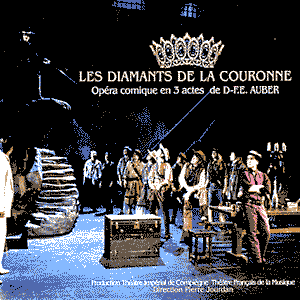 Composer: Daniel-François Esprit Auber (1782-1871)
Composer: Daniel-François Esprit Auber (1782-1871)
Performers: Ghyslaine Raphanel (sop), Mylène Mornet (sop), Christophe Einhorn (ten), Armand Arapian (bar), Dominique Ploteau (ten), Paul Médioni (ten), Nicolas Gambotti (ten), Sébastien Lemoine; Cori Spezzati, Orchestre de Picardie/Edmon Colomer
Recorded: Théâtre Impérial de Compiègne, December 1999
Record Label: MANDALA (Harmonia Mundi)
Number: MAN 5003/05 (CD1 55.18; CD2 55.42; CD3 47.55)
In the French tradition of producing comic opera, “The Crown of Diamonds” is a charming, enjoyable addition to the repertory. Daniel-François Esprit Auber’s intricate, humorous composition comes alive under the artful baton of Edmon Colomer. With the support of Cori Spezzati and Orchestre de Picardie, the comedic, musical misadventures delightfully unfold across the three acts.
The cast delivers a generally satisfying performance. Ghyslaine Raphanel shows remarkable talent, her soprano voice delivering an enchanting performance, while Mylène Mornet provides noteworthy balance with her tempered sopranic tones. Nicolas Gambotti does an exceptional interpretation of his tenor role, his mature voice bring a unique depth to the production. On the other hand, although Christophe Einhorn demonstrates considerable vocal talent, his performance could benefit from a touch more expressiveness.
Armand Arapian, the baritone, is another highlight of the ensemble. His seasoned delivery and firm hold on the comic timing add another level of vivacity to the performance, making it more relatable and enjoyable.
The sound quality is commendable, with a respectably vivid and concise capture of voice levels and orchestra tones. Mandala (Harmonia Mundi) impressively maintains the audio quality evenly distributed throughout the three CDs.
On an analytical level, the libretto is not problematic, sticking to the traditional comic opera format of light relief and delivering the standard dose of humor. The inherent wit blends well with the light-hearted comic elements beautifully expressed through Auber’s vivacious music.
Overall, “The Crown of Diamonds” is a delightful albeit not groundbreaking comic opera that surely gratifies the connoisseur and amateur alike. For those unfamiliar with Auber’s work, this piece provides an ideal entre, synthesizing brevity, humor, and charm in a musically proficient production. A solid performance with any noticeable shortcomings easily overshadowed by the overall enjoyment it provides.